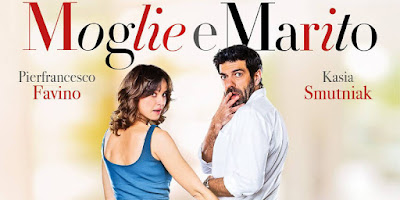Editor’s Note: Barrie Pattison's earlier reports on
the Italian Film Festival can be found if you click on the following film
titles After the War, I Can Quit Whenever I Want to: Masterclass, Let Yourself Go, Messy Christmas, Stories of Love that cannot Belong to this World,
These Days & Sicilian Ghost Story, From Naples with Love & Ignorance is Bliss
and Fotunata & The Intruder
Thorne Smith didn’t know what he was starting when he wrote “Turnaround” in 1931 - the bodies of a husband and wife are switched by a pagan deity. Hal Roach made a 1940 movie of it which was pretty much suppressed. The Legion of Decency considered it morally objectionable (in part) and it didn’t get the re-issues scored by Roach’s other feature efforts like Topper and Captain Fury. However, viewers with a long memory gave it a word of mouth reputation as kinky.
Comes 1948 and Peter Ustinov did Vice
Versa with father and son switching bodies (compare Dudley Moore in 1987s Like
Father Like Son) and we get the Debbie Reynolds and Tony Curtis in Goodbye Charlie of 1964. (“All my life
I’ve been a gourmet and suddenly I’m a lamb chop”). Throw in a couple of Freaky
Friday’s. I would think the personality swap thing had pretty much had its
day by now.
However, Simone Godano figured the idea
could stand another go round as her first movie Moglie e marito/Wife &
Husband. I wasn’t so sure. To start with macho Pierfrancesco Favino (Suburra)
and elegant Kasia Smutniak (Perfetti Sconosciuti/Perfect Strangers) seem
unlikely contenders for a gender swap but that’s the thing that drives the
film. Inner Favino having to come to terms with kissing outer Favino with three
days growth of beard is in the same dodgy area as Hal Roach but they embrace
the possibilities and the leads enjoying making out is one of the funniest
parts of the film.
He’s a scientist trying to produce a
machine which will transfer memories from one individual to another and she’s a
sleek wannabe TV personality. Their marriage is on the rocks when his machine
swaps them over. There is the now familiar uneasy comedy of her acting butch
and him fluttery but they do manage to get laughs out of inner Favino
sitting with legs apart revealing his panties on her TV show and moving into
startled Valerio Aprea’s flat while Kasia is outraged that he is putting junk
food into her trim body and letting the baby breast feed after she had weaned
it.
 |
| Pierfrancesco Favino, Kasia Smutniak, Moglie e Marito |
The piece gains a bit more traction when
the pair have to use their old skill sets to sort out the problems they have
caused but the ending when both have to articulate what they’ll miss if the
transfer is reversed is actually quite touching.
Best glossy European production values
put the characters into plausible home, laboratory and TV industry settings. Intriguing
to consider what the first female director in this cycle does differently.



